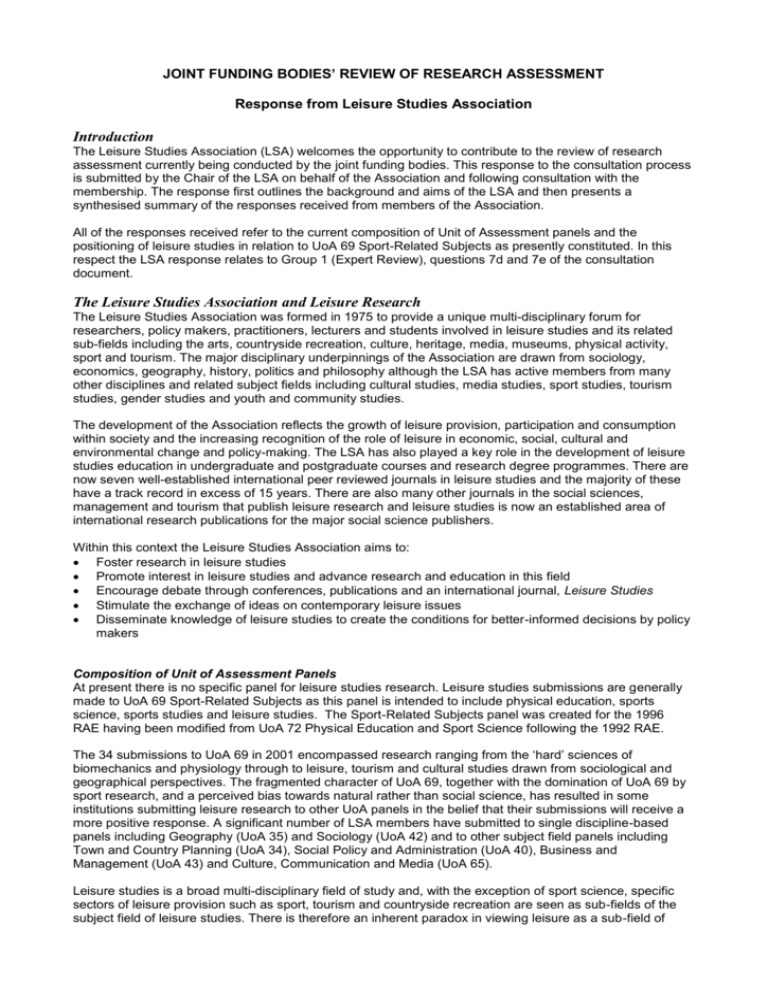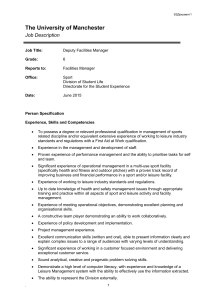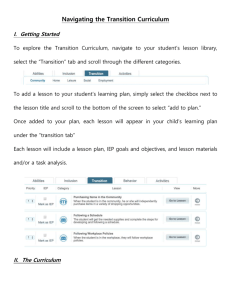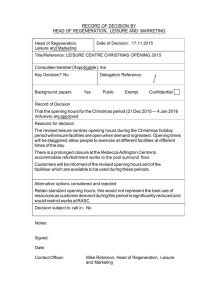The Leisure Studies Association and Leisure Research
advertisement

JOINT FUNDING BODIES’ REVIEW OF RESEARCH ASSESSMENT Response from Leisure Studies Association Introduction The Leisure Studies Association (LSA) welcomes the opportunity to contribute to the review of research assessment currently being conducted by the joint funding bodies. This response to the consultation process is submitted by the Chair of the LSA on behalf of the Association and following consultation with the membership. The response first outlines the background and aims of the LSA and then presents a synthesised summary of the responses received from members of the Association. All of the responses received refer to the current composition of Unit of Assessment panels and the positioning of leisure studies in relation to UoA 69 Sport-Related Subjects as presently constituted. In this respect the LSA response relates to Group 1 (Expert Review), questions 7d and 7e of the consultation document. The Leisure Studies Association and Leisure Research The Leisure Studies Association was formed in 1975 to provide a unique multi-disciplinary forum for researchers, policy makers, practitioners, lecturers and students involved in leisure studies and its related sub-fields including the arts, countryside recreation, culture, heritage, media, museums, physical activity, sport and tourism. The major disciplinary underpinnings of the Association are drawn from sociology, economics, geography, history, politics and philosophy although the LSA has active members from many other disciplines and related subject fields including cultural studies, media studies, sport studies, tourism studies, gender studies and youth and community studies. The development of the Association reflects the growth of leisure provision, participation and consumption within society and the increasing recognition of the role of leisure in economic, social, cultural and environmental change and policy-making. The LSA has also played a key role in the development of leisure studies education in undergraduate and postgraduate courses and research degree programmes. There are now seven well-established international peer reviewed journals in leisure studies and the majority of these have a track record in excess of 15 years. There are also many other journals in the social sciences, management and tourism that publish leisure research and leisure studies is now an established area of international research publications for the major social science publishers. Within this context the Leisure Studies Association aims to: Foster research in leisure studies Promote interest in leisure studies and advance research and education in this field Encourage debate through conferences, publications and an international journal, Leisure Studies Stimulate the exchange of ideas on contemporary leisure issues Disseminate knowledge of leisure studies to create the conditions for better-informed decisions by policy makers Composition of Unit of Assessment Panels At present there is no specific panel for leisure studies research. Leisure studies submissions are generally made to UoA 69 Sport-Related Subjects as this panel is intended to include physical education, sports science, sports studies and leisure studies. The Sport-Related Subjects panel was created for the 1996 RAE having been modified from UoA 72 Physical Education and Sport Science following the 1992 RAE. The 34 submissions to UoA 69 in 2001 encompassed research ranging from the ‘hard’ sciences of biomechanics and physiology through to leisure, tourism and cultural studies drawn from sociological and geographical perspectives. The fragmented character of UoA 69, together with the domination of UoA 69 by sport research, and a perceived bias towards natural rather than social science, has resulted in some institutions submitting leisure research to other UoA panels in the belief that their submissions will receive a more positive response. A significant number of LSA members have submitted to single discipline-based panels including Geography (UoA 35) and Sociology (UoA 42) and to other subject field panels including Town and Country Planning (UoA 34), Social Policy and Administration (UoA 40), Business and Management (UoA 43) and Culture, Communication and Media (UoA 65). Leisure studies is a broad multi-disciplinary field of study and, with the exception of sport science, specific sectors of leisure provision such as sport, tourism and countryside recreation are seen as sub-fields of the subject field of leisure studies. There is therefore an inherent paradox in viewing leisure as a sub-field of sport within UoA 69 and this anomaly was exacerbated in 2001 when it was made clear that tourism research was also permissible within UoA 69 as a ‘sport-related subject’. Like leisure research, tourism studies research is not necessarily ‘sport-related’ but has no obvious panel to submit to and is fragmented between the same panels as leisure research. Such is the fragmentation of UoA 69’s coverage that two institutions entered two separate submissions for sports science and social science in 1996. Although there was a similar number of submissions to UoA 69 in 1996 (33 submissions) and 2001 (34 submissions), the composition of the submissions altered between 1996 and 2001 to include more sport science submissions and fewer social science submissions in 2001. It is the view of LSA members that leisure research has therefore been further marginalized from UoA 69 in the most recent RAE. The panel membership of UoA 69 continues to be dominated by sport researchers with only three of the twelve panel members coming from a leisure studies or leisure research background in 2001 and only two from nine panel members drawn from leisure studies in 1996. There is a strong feeling within the membership of the LSA that UoA 69 does not serve the interests of leisure studies researchers adequately and that the present structure of RAE categories does more to fragment than cohere the established subject field of leisure studies. The Association would therefore welcome a review of subject-field research groupings in relation to the RAE including sport science, sport studies, leisure studies, cultural studies and tourism studies with a view to developing a structure of expert peer review where the majority of leisure research is judged within one Unit of assessment and by experts in leisure studies.






